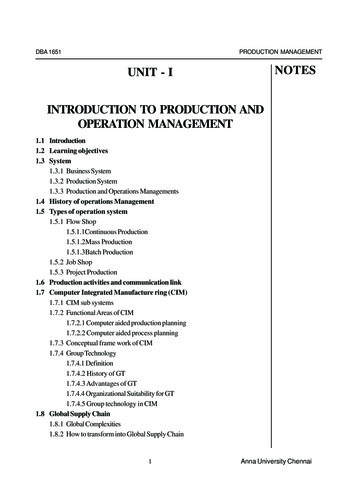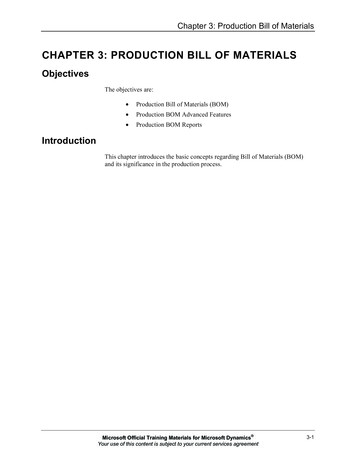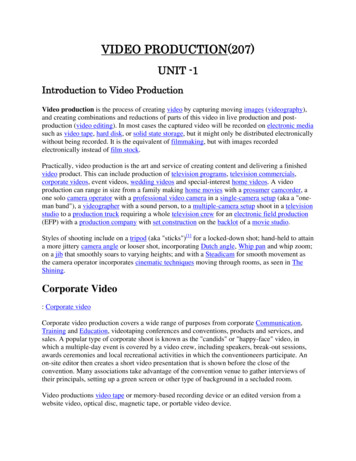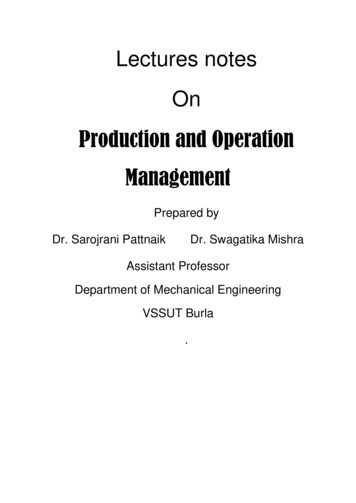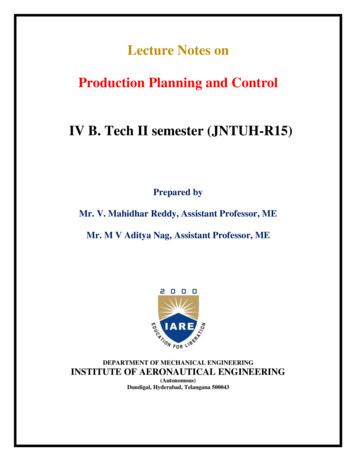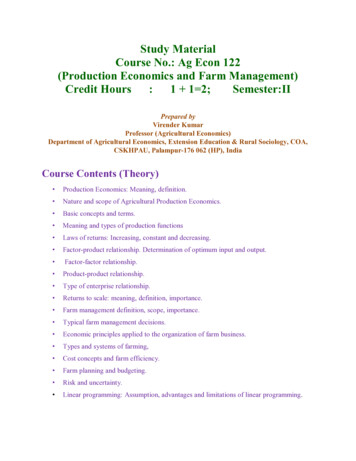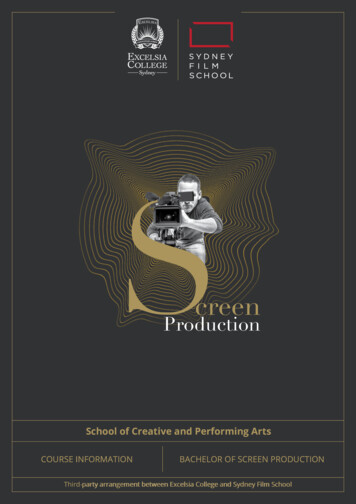
Transcription
creenProductionSchool of Creative and Performing ArtsCOURSE INFORMATIONBACHELOR OF SCREEN PRODUCTIONThird party arrangement between Excelsia College and Sydney Film SchoolThird-party
THE BACHELOR OF SCREEN PRODUCTION PARTNERSHIPINTERNATIONALLYAWARD-WINNING LECTURERSTHE CREATIVE TRIADStudents are taught and mentored by topSydney, Australia that offers a creativeindustry professionals giving one-to-onedevelopment to confidently stand out in acompetitive industry.The only higher education provider inhub of specialist students who can write,create, act, perform and produce allelements of filmmaking in-houseWORLD-CLASS FACILITIESRICH AND MEANINGFUL FILMMAKINGThe partnership provides industryquality equipment and creates a uniqueenvironment of collaboration with anexpansive industry network.Often film degrees can teach you the skillsbut not the storytelling. The Bachelor ofScreen Production will transform yourabilities to craft a narrative like no other.Excelsia College is proud to be partnering with one of the world’s topfilm schools as ranked by Variety magazine, Sydney Film School, todeliver the Bachelor of Screen Production. The degree offers a uniquemodel of training, inspiring students to become the next generation ofscreen creatives. The program is delivered by Sydney Film School andExcelsia College at the two campuses, with the program accredited andqualifications provided by Excelsia College.
ABOUTEXCELSIA COLLEGEEstablished in 1983, Excelsia College, one of Australia’s leading Christian higher education providers, is an innovativeand creative community of people who are passionate about excelling and growing academically, professionally,personally and spiritually. Our students and alumni embark on a journey of lifelong learning and leadership. ExcelsiaCollege staff are passionate about students achieving their goals and being cared for on their career path.In the Bachelor of Screen Production, an Excelsia College Course Manager is stationed at Sydney Film School’sWaterloo campus, providing support to students and integrating Excelsia’s vision, mission and policies.WORLD-CLASS MENTORSHIPTHEATRE FACILITIES AND LIVE SHOWSOne-on-one tutoring and mentoringfrom high calibre academics.Extensive program of on-campus shows includingtheatre, live music and student-run events.ULTRA FAST INTERNETALUMNI AND INDUSTRY NETWORKWith speed of up to 1000 Mbps, makingit one of Australia’s fastest campuses*Over 3,000 alumni and accomplished academicsaround the world who can attest to our whole ofperson education.(*at the time of publication)OUR VISION: Excelsia contributes to making a better world through active participation in a lifetransforming global Christian learning community.OUR MISSION: Excelsia is an academic community benefiting the world by producing researchcharacterised by exemplary scholarship consistent with a Christian world view, and graduates preparedto lead in a range of professions.OUR VALUESOur values reflect our vision andour mission:1. Christ-likeness: striving toexemplify the life of Christ inour commitments, our actionsand our relationships.2. Innovation and creativity:working with passion andimagination in a range ofinfluential professions, tofurther God’s transformativework in the world.3. Scholarship: creating aculture that values the searchfor truth, supports academicfreedom and rewardsrigorous thinking.4. Service to the community:using our skills and abilities inand beyond the Institution inthe service of others.5. Lifelong learning: continuallyseeking knowledge, wisdomand capability to flourish andcontribute in a changing world.GRADUATE ATTRIBUTES1. Deep Knowledge A deep, coherent and extensive knowledge of studied disciplines characterised byintellectual openness, creativity and curiosity.2. Critical Analysis Willingness and ability to analyse issues logically, consider different options andviewpoints fairly, and make informed decisions in relevant artistic, academic and/orprofessional contexts and settings.3. Lifelong Learning A commitment to lifelong learning characterised by a willingness and ability to acquire,develop and apply knowledge and skills that facilitate positive adaptations to achanging world.4. Effective Communication Aptitude to communicate information, arguments and ideas effectively and ethicallythrough writing, speech and/or artistic expression as appropriate within each discipline.5. Christian Ethical Action A sound knowledge and understanding of Christian values and beliefs, and of therelevance of Christian faith to personal life, professional ethics, and social concerns.6. Self Direction A capacity for self-directed learning and activity while working effectively with others inscholarly, vocational, civic and/or artistic pursuits and endeavours.7. Technical Competence Competence and facility with materials, processes and technologies relevant to learneddisciplines, generic information literacy and professional practice.8. Responsible Innovation Oriented towards exhibiting intellectual and artistic enterprise, innovation andindependence in constructive, creative and responsible ways.4
CAMPUS FEATURESEXCELSIA COLLEGE RECEIVED EXCELLENT RESULTSacross the board in the 2020 QILT national survey, registering scores higher than the national averagein all but one metric of student experience for undergraduate and postgraduate courses.EEEEndergraia Uduelsaxcia Postgraduelsatxceia Postgraduelsatxctendergraia UduelsaxcStudent Supporteia PostgraduelsatxcteETeaching Qualityendergraia UduelsaxcteEOverall Quality ofEducational nal Average72.0%National Average79.5%National Average79.2%National Average73.9%National Average74.3%National Average280,301 UNDERGRADUATE AND POSTGRADUATE STUDENTS135 HIGHER EDUCATION INSTITUTIONS ACROSS AUSTRALIAQuality Indicators forLearning and TeachingCAMPUS FEATURESCONVENIENT LOCATIONExcelsia College is located at 69-71 Waterloo Road, Macquarie Park, NSW, 2113, Australia.LibraryAuditorium/TheatreRecording studioMac labMetro StationMacquarie UniversityMacquarie CentreDrama and music specialist roomsStudent support centreDisability supportAcademic skillsIndigenous support CounsellingPastoral careCareer supportEnglish language supportStudentfacilitiesFree wifiTable tennisStudy desksPool tableSnacks barAir hockey tableFree coffeeOutdoor balconyMicrowavesBasketball ringFrank Green Smart CupsExcelsia CollegeTRANSPORT5-min walk from Macquarie ParkMetro StationMetro StationMacquarie Park1-min walk to bus stopPFree parking5
ABOUTSYDNEY FILM SCHOOLSydney Film School, located at Waterloo Studios, was founded in 2004 out of a desire to create a practicalfilmmaking experience focusing on the skills that are required for a successful career in the global filmindustry. The School has significant partnerships with international film and acting industry heavyweights.Students are offered opportunities to be part of industry productions wherever possible.Waterloo Studios houses state-of-the-art facilities and equipment including a sound stage, cinema, movementstudio, training rooms, production offices, post-production mastering suite, editing suites and animationpods. It is an award-winning production studio, winner Tertiary Category, 2014 Master Builders AssociationExcellence in Construction Award.WORLD-CLASS MENTORSHIPHIGH-QUALITY TEACHERSWe offer one-on-one tutoring andmentoring from high-calibre academicsAll teachers work in the industry andwe invite prominent film personalitiesto share career experienceHIGH RANKINGTANGIBLE ALUMNIProudly ranked by Variety Magazine asone of the world’s top film schoolsWe are well connected with our 1,000alumni, the majority of whom arefollowing successful screen careersaround the worldCAMPUS FEATURESResource and reference librarySydney Film School is located at 242 Young St, Waterloo NSW 2017, Australia.Sound stageGreen screenMovement studioTraining roomsProduction officesSydneyFilm SchoolScreening roomSound recording studioMac labs – Avid, Pro ToolsPremiere, DaVinci Resolve softwareDigital and film camerasCamera support and accessoriesLensesLightingLocation sound recording equipmentStudentfacilitiesFree wi-fiEast VillageStudent kitchenMicrowavesWheelchair accessWoolworthsShoppingTrain StationGreen SquareTRANSPORT900m walking distance fromGreen Square Train StationP300m from Bourke Stand Elizabeth St Bus StopLimited parking on campus6Shopping Centre
Bachelor ofSCREENPRODUCTIONThe Bachelor of Screen Production isa unique model of training that isvalue-driven, heavily practical,industry-informed, professionallysustainable and socially directed.Course duration: 3 years full-timeCredit points:144Delivery: n campus at Macquarie ParkOand at WaterlooAvailable to: Domestic and internationalCRICOS:104943KIELTS:6.0 with no band less than 6.0AQF:Level 7FinancialFEE-HELP available for domesticStudents will experience:information:students state-of-the-art studio facilities unrivalled production opportunitiesCourse tuition fee:International students: 10,000– our students make around 100semester/ 60,000 total tuition feeshort films each year (subject toFor more information, refer to our Course Fees page.numbers and loading) their own production budgetsincluded in the course fee an opportunity to build up to 12 to 16 screen credits over two years access to a pool of acting students through Excelsia College’s Dramatic Art program and Sydney Actors School an environment that replicates the real-world industry practice.Over the entirety of the course students experience a variety of roles in numerous productions which enables a diverseskill set when entering the industry. Students are organised into working film crews to practise on-set exercises anddevelop the necessary creative and organisational documentation to launch into filming. Screen productions caninclude short films, web-series pilots, documentaries, and experimental projects. The course teaches unique theory andphilosophy for contemporary filmmakers, offering rich terrain for cinematic exploration. The course aims to inspirefilmmakers and creatives using centuries of compelling storytelling narrative and self-reflection integrated with modernconcepts and industry practice. For more details, refer to: /bachelorof-screen-production/The course has been designed for future: writersdirectorscinematographersproduction designers sound recordists and sound editors or designers screen editors production managers and coordinators.What do our students say?Sydney Film School allowed me to have a hands-on approach to filmmaking and to mychosen specialty, sound. By working together with my fellow students as a team, I had tremendousexperience and gained a very strong insight into the film industry. The professional mentors fromSydney Film School were always there for me, constantly guiding me through this great journey.I was very honoured to have received ASS award, which was called the Greg Bell StudentEncouragement Award. Sydney Film School nominated me with two films out of my showreel tothe ASSG. The films were ‘Drop Pocket’ (2017) and ‘Une pensée pour toi’ (2018).Jacob Hafner KeelanSydney Film School GraduateWinner of the Australian Screen Sound Guild’s Student Encouragement Award7
COURSE OVERVIEWTo develop excellence in the art,craft and technology of screenproduction, we believe studentscrucially need critical thinking skillsto analyse and evaluate currentindustry practices and strategicallyexplore new modes of storytellingand dissemination, whether it’s in acinema or online. Upon graduation,students will have acquired screenproduction, storytelling andentrepreneurial skills, andspecialised capabilities such aswriting, directing, cinematography,design, sound or post-productionthat will equip them to beinnovative, professional and ethical.The Bachelor of Screen Production is a program of 144credit points consisting of 24 core units of study and8 electives.Students begin the course by building competency in arange of production skills such as directing andcinematography, complemented by progressively morechallenging and divergent production projects.As students progress they select and specialise in one ortwo production roles through mentoring and advancedtraining. Theory is integrated throughout the course asstudents deepen their awareness of how filmmakingtechnology impacts and shapes social values by changes indifferent expressions of screen communication.As they finish their degree, students learn practical skills indesigning a creative career to confidently enter the industryand establish their future.8
BACHELOR OF SCREEN PRODUCTIONENTRY REQUIREMENTSEDUCATIONAL PREREQUISITESApplicants for admission into the Bachelor of Screen Production will be required to provide evidence of completionof the NSW Higher School Certificate or its interstate or overseas equivalent, or attainment of tertiary qualification, orsatisfactory completion of at least one year’s full-time load in a tertiary course.ARTISTIC AND ACADEMIC SKILL ASSESSMENTPortfolio: Applicants are required to present two short examples with a written rationale that demonstrate the applicant’screative work. For more details on requirements, refer to: /bachelor-ofscreen-production/Interview: Applicants will discuss their special areas of interest in film or video, any related experience they may have, andwhy they wish to do the course.FOR INTERNATIONAL STUDENTSOverseas students applying for admission to Excelsia College courses must have reached the age of 18 years by thecommencement of their studies. Excelsia College will not admit overseas students who have not yet reached 18 years of age.ENGLISH LANGUAGE PROFICIENCYCandidates whose qualifying studies were completed in a language other than English will normally be required todemonstrate English proficiency equivalent to the overall minimum score of 6.0 (no band less than 6) in the IELTS Academictest or equivalent. For test score equivalencies for alternative tests visit: /WORK AND LIFE EXPERIENCE APPLICANTSFor the applicants with life and work experience, TAFE or VET studies and higher education, please find the admissionrequirements at: /bachelor-of-screen-production/9
Core UnitsF I RST SEMEST ERProduction IThis unit introduces students to thetheoretical and practical skills requiredto complete development and the preproduction stages of filming for a shortfilm project. Practical on-set exercisesto develop students’ understandingof on-set protocol and logistics arecombined with theoretical studies intothe pre-production and productionchain of command, personnel andprocesses. Students are organised intoworking short film crews to practiseon-set exercises and develop thenecessary creative and organisationaldocumentation to launch into filming insecond semester.Introduction to Specialty WorkshopsStudents are introduced to aspecialised role in screen productionand acquire technical and theoreticalskills required to perform that role inthe corresponding Production I-VI unit.Specialisations in this first workshopcould include producing, 1st assistantdirecting, costume/set design, soundrecording, production management,and continuity/script supervision, andneed to be decided in consultationwith the lecturer and Course Manager.Students learn these skills in weekly,hour-long small group sessions witha mentor from their specialisation,culminating in the production ofexercises related to their specialisation.Production DesignStudents will be provided with conceptualand practical tools to develop and realisethe visual approach of a screen project.They will be introduced to fundamental10concepts of production design includingthe role and responsibilities of theproduction designer, the collaborativeprocess and the physical elements ofa production design. Script analysisfor design is explored, analysing story,characters, themes, narrative structureand stylistic elements.CinematographyThis unit introduces cinematographytheory and industry-standard practicesto enable students to undertake therole of cinematographer and other
BACHELOR OF SCREEN PRODUCTIONroles within the camera and lightingdepartments. Students are required todemonstrate a foundational technicalknowledge of cinematography andarticulate an understanding of thecreative aspects that will inform acinematographer’s approach to screenproduction, including collaboration withother key creative departments.DirectingThis unit introduces students to thespecific functions of the screen directorthrough a foundation in the theory ofscreen direction and its application inscenes. The unit includes a historicaloverview of screen performance and aseries of practical workshops that scaffoldstudents through scene breakdowns,casting actors, conducting rehearsals,defining blocking and devising coverage,including storyboarding and shot lists.Students also learn to analyse andapproach a text from a directorial pointof view.Foundations of Screen StorytellingThis unit introduces students to thefoundations of screen storytelling. Theunit provides an overview of storytellingthrough image, sound, design, direction,editing and performance. Students willlearn to analyse and evaluate screenworks in regard to the various creativecontributions (direction, scripting,cinematography, design, performance,sound, and editing). This foundationalunit provides a common, shared languagefor analysis and evaluation of screenexcerpts that students will encounter inthe various discipline-specific units theywill study elsewhere in the Bachelor ofScreen Production course.production and post-production phasesof the screen production cycle. Theunit examines the production phase inits actualisation and flexibility aroundall that was envisaged and planned inthe pre-production period. Similarly,the post-production phase is analysedin regard of both the development ofediting skills and the stage of reflectionwhere students can evaluate theirpersonal development and areas forimprovement. Students are kept inthe same crews as first semester towork on the post-production exercises,complete their short films andparticipate in a debriefing phase fortheir films.Screen EditingThis unit introduces students to theconcepts, structures, aesthetics,techniques and technologies involvedin digital post-production. Studentlearning has a particular emphasisin the editing process, with a generaloverview of sound, graphics, and colourgrading. Non-linear editing techniquesand approaches are demonstrated,discussed and applied by students withregard to both technical and aestheticperspectives. Students will analyseeffective storytelling as it is achievedthrough the craft of editing and throughan appreciation of various editingtheories and post-production processes.They will also develop media workflowSECON D SEM EST E RProduction IIThis unit continues studentunderstanding of the theoretical andpractical skills involved in producingshort films with the introduction to the11and project management skills, evaluateappropriate media exchange processes,and identify the personal skills requiredto edit footage for a variety of screenproduction projects.Sound Post-ProductionThis unit equips students with aconceptual understanding andtechnical foundations in the use ofaudio post-production techniques andsound design for screen production.Students will be instructed in the useand application of the digital audioworkstation Pro Tools as it is consideredto be the industry standard. Studentswill construct and edit audio in screenproductions and analyse the importanceof sound in relation to moving image.Philosophy for the ContemporaryFilmmakersThis unit introduces students to arange of tools, concepts and ideasthat will enable them to examine boththeir own particular world view andthat of others. It challenges studentsto engage critically with philosophy,popular culture, religion and their ownart to begin to examine what they thinkabout the world and why. Students arechallenged both as consumers andproducers of content to evaluate thesubconscious world view assumptionsand didactic intent of the culturalproducts they engage with.
Core UnitsTHI RD SEMEST ERProduction IIIThis unit introduces students to thecreative and practical considerations ofcreating documentaries in the modernworld. Students are encouragedto examine the breadth of thedocumentary genre and its creativepractice as well as its role in news,journalism and the media.Specialty Workshop IThis unit is the second in the sequenceof three units where students focuson a specialised screen productionrole. In this unit students furtherdevelop the technical and theoreticalskills required to perform that specificrole in the corresponding ProductionI-VI unit. Students learn these skills inweekly one-hour one-to-one sessionsacross the semester, culminating in theperformance of a role in a productionand a creative task pertaining totheir specialisation. Specialisationscould include 1st assistant directing,cinematography, sound recording,production design, productionmanagement, post-production sound,editing, continuity, directing andproducing, and need to be decidedin consultation with the lecturer andCourse Manager.points. They will critique their workthrough script editing processes andexercises to explore how charactersform the basis of stories through acinematic format.Screen HistoriesThis unit provides students with thetheoretical framework and analyticalskills to appreciate the interplaybetween technological, social, political,economic, cultural and aesthetic trendsthat have shaped the various historiesof film, television and online screenproduction in the West. Students areencouraged to explore specific periodswhere technological innovation and/or cultural change generate newstories and new audiences, and tounderstand that the patterns of thepast continue to impact present andfuture modes of storytelling on screen.While the focus in the early decadesScreenwritingThe purpose of this unit is to introducestudents to the processes of screenwriting including finding inspiration forconcepts and formulating ideas into adramatic and visual form. Students willanalyse short film genres by applyingstructural techniques and industrystandard writing formats to produce afinal draft short film screenplay. Theywill learn to identify character point ofview and start analysis between outerand inner journeys of their characters.They will draw focus on a lyricalmoment in their film to bring emotionto their character’s major turning12of the twenieth century will focus onAmerican and European cinema (dueto their significance in the shapingof contemporary Western screenstorytelling) recognition will also bemade of the effects of exposure toscreen stories from the Pasifika regionin more recent decades.FOUR T H S E ME S T E RProduction IVThis unit offers students the opportunityto produce and direct their own thesisfilm. Students will learn to build ontheir existing knowledge of filmmakingto create a screen product, from initialconcept, to pitching, filming and postproduction. Students are encouraged toreflect on the creative process, examinewhere their work fits in the overall bodyof modern screen content and devisework that reflects both their creative andcareer ambitions.
BACHELOR OF SCREEN PRODUCTIONSpecialty Workshop IIThis unit is the third in the sequenceof three units where students focuson a specialised screen productionrole. In this unit students furtherdevelop the technical and theoreticalskills required to perform that specificrole in the corresponding ProductionI-VI unit. Students learn these skills inweekly small-group one-hour sessionsacross the semester, culminating in theperformance of this role in Production IV(Minor Screen Production) and a creativetask pertaining to their specialisation.Specialisations could include 1stassistant directing, cinematography,sound recording, production design,production management, postproduction sound, editing, continuity,directing and producing, and need to bedecided in consultation with the lecturerand Course Manager.Screen GenresThis unit provides students with thetheoretical framework and analyticalskills to engage with a wide variety ofscreen (film and television) genres thathave endured and evolved over time.Students are encouraged to identifythe particular screen storytellingtechniques and consequent feelingstates that are used to both assureand unsettle audience expectations.The unit also offers practicalopportunities for students to test outhow genre conventions might workin a screen trailer that they devise.Screen genres are a tool of thestoryteller to both satisfy and createunanticipated desire in the experienceof the audience.The Filmmaker’s Life in FocusThis unit focuses on the everyday andcreative lives of students undertakingthe unit. The interrelationship ofwork, play and creativity will beexamined to allow students to beginto deduce their practical place in theworld both as artists and humans.Particular consideration will be givento topics such as global citizenship, thephilosophy of artistic creation, ethicalcreative practice and sustainableartistic habits.FI FT H S E ME S T E RProduction VIn this unit students learn how to frameand develop creative concepts, projectsupport and human and financialresourcing required for a substantialscreen production. Students fulfil a keycreative role (direction, cinematography,sound (production and post), productionmanagement, production design, orediting) in one or more major screenproductions. Students select theirkey production role in consultationwith both the Lecturer and CourseManager. Screen productions mayinclude short films, web-series pilots etc.This unit enables students to analyse,evaluate and apply themselves to themost appropriate production formatfor their particular vision and futurecareer aspirations. This unit overlapswith Production VI as each studentprogresses from pre-production toproduction to post-production of theirmajor screen projects.13Production Support Role AThis unit supports students in a specialtysupport role on another student’s majorscreen production in Production V/Production VI. Students further developskills pertaining to another field ofspecialisation and develop the abilityto analyse their work in the contextof another student’s vision. Studentsalso learn fundamentals of upwardsmanagement and how to follow acreative brief. Students may choose afield that has previously not been theirspecialty with consultation with theCourse Manager. Specialisations couldinclude 1st assistant directing, continuityor script supervision, 1st cameraassistant, clapper or data wrangler, gaffer,grip, design support (set or prop sourcingand construction, costume, set dressing),producing and production management.International Industry AnalysisThis unit provides students with thetheoretical framework and analytical skillsto engage with current issues within theinternational film industry. Students areencouraged to explore the economicand cultural influences on the filmindustries of a variety of countries andto understand the varying relationshipsbetween individual countries’ industryneeds and creative output.
Core Unitsparticular chosen field of specialisationand develop the ability to analysetheir work in the context of anotherstudent’s vision. Students also focussome of their time on developingan understanding of the particularcareer opportunities and risks of theirchosen specialty within Production V/Production VI. Students may choosea field that has previously not beentheir specialty with consultation withthe Course Manager. Specialisationscould include 1st assistant directing,continuity or script supervision, 1stcamera assistant, clapper or datawrangler, gaffer, grip, design support(set or prop sourcing and construction,costume, set dressing), producing andproduction management.Designing My Creative CareerSI XT H SEM EST ERProduction VIThis second unit for Major ScreenProduction provides the learningopportunity for students to followthrough their creative and pragmaticvision of a project from postproduction to the marketing of boththe screen product and their ownprofessional career. Students willanalyse and evaluate how their ownemergent screen production practicealigns with industry practitioners thatthey admire in their chosen craftdiscipline. They will also identify whataspects of their creative process increating this major screen project canbe effectively marketed to promote thefinal screen production.Production Support Role BThis unit supports students in aspecialty support role on anotherstudent’s major screen production inProduction V/Production VI. Studentsfurther develop skills pertaining to their14This unit provides students withthe opportunity to critically reflecton their own creative and businesspractices and to proactively engagein learning about and constructingtheir own small business to supporttheir craft. Through a multidisciplinarylens, this unit investigates the mental,physical, financial, social and careermanagement competencies requiredto build a sustainable career in thescreen industries in Australia. This unitsystematically integrates academicresearch, national arts policy and smallbusiness practices as it examinesthe place of creatives within theAustralian context. In doing this itprovides the foundations for studentsto engage in lifelong learning aroundtheir craft and aims to build a holisticframework of learning that supportsstudents to engage in sustainedcreative employment. It is imperativethat students not only engage withthe lecture series and tutorials, butapply the concepts, activities and toolsstudied in class to their own creative
1-min walk to bus stop Free parking Metro Station Macquarie University Metro Station Macquarie Park Excelsia College Macquarie Centre Excelsia College is located at 69-71 Waterloo Road, Macquarie Park, NSW, 2113, Australia. Student facilities 280,301 UNDERGRADUATE AND POSTGRADUATE STUDENTS 135 HIGHER EDUCATION INSTITUTIONS ACROSS AUSTRALIA
